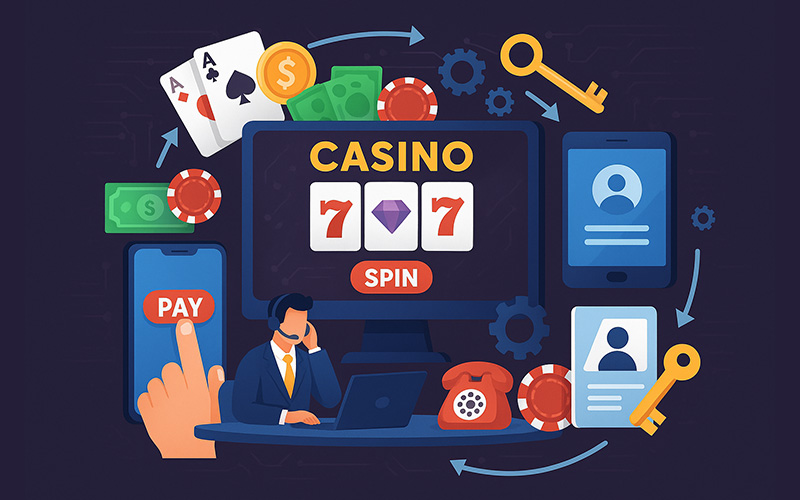Why iGaming Operators Must Move and Adapt
The gambling industry has a technology problem. Systems that once kept sportsbooks and casinos reliable now slow them down, soak up budgets, and block new ideas. Patching feels safer than replacing, but each quick fix adds weight. Over time, platforms become a tangle of parts that are costly to maintain and hard to improve.
However, the market will not wait. Player expectations move with the broader digital economy, while the AI wave is raising the bar for speed, relevance, and personalisation. Operators who hesitate risk falling behind competitors that experiment, iterate, and deploy faster. The biggest issue is no longer a difficult migration. It is about doing nothing while the gap widens.

The Migration Dilemma
Changing platforms is never a simple job. Moving data safely, reconciling wallets, and keeping product lines online without problems are essential tasks. So, many teams delay the jump and opt for incremental changes that seem safer at the time, but slow things down with every sprint.
Here is where the trap closes. Years of “temporary” fixes create cumbersome, multi-vendor stacks that demand constant care and resist meaningful upgrades. Teams spend more time keeping the existing framework than building new features. The company pays a growing “complexity tax” while rivals learn quicker.
Before operators commit to any new path, they should recognise the real risk profile. The danger is not a single cutover event but an endless transition.
What hesitation produces in practice:
- ever-rising maintenance overhead;
- slower releases and longer QA cycles;
- fragile integrations that break under load;
- limited room for AI and personalisation;
- talent attrition due to tech fatigue.
Focus is what decisive migration is all about. These days, it's important to do fewer things but do them all the way. Decommissioning obsolete modules is a much better way to make progress since it involves closure.
New Expectations from Adaptability
Competition is no longer a battle among familiar operators. Entertainment and technology giants now touch the same customer moments, from live sports broadcasts to app stores and social platforms. Brands with global reach, deep pockets, and refined digital playbooks can shift user expectations almost overnight.
Recent moves show the trend. A flagship media brand connected its sports network with a sportsbook product in the United States. A leading ecommerce and streaming company threads wagering content into major league coverage. App store owners from mobile and social ecosystems already allow gambling apps in regulated markets. The boundary between media, commerce, and wagering is getting thinner by the day.
Operators must understand that a slow, rigid stack will not survive higher standards for speed, personalisation, and reliability.
What should be changed immediately:
- benchmark for product polish and uptime;
- demand for personalised journeys across devices;
- cost of acquiring and retaining attention;
- expectations for seamless compliance and payments;
- searching for senior tech and data talent.
Built to Extend and Personalise
The right platform runs fast under pressure and still leaves space to shape the experience around markets, brands, and goals. It is not a closed box, but a toolkit designed for change.
Two pillars matter most:
- A sportsbook and casino layer that integrates cleanly through modern iFrames or widgets, so advanced markets or game catalogues drop in without the stack delay.
- A turnkey foundation that includes the essentials to launch and keeps doors open for custom modules, data flows, and third-party services.
This approach reflects lessons from mature B2C operations that handle significant volumes. Those teams understand their audiences. The platform’s job is to enable adaptation of offers, journeys, and operations. Clients extend, plug in, and push. The core does not fight them but supports, hardens, and accelerates.
In 2025, players expect adapted paths. AI makes this possible at scale and turns data into journeys that feel timely and personal.
How artificial intelligence facilitates personalisation:
- Faster discovery. The system surfaces the right markets, games, or boosts after only a few actions, so players do less scrolling and more playing.
- Smarter promotions. Offers adapt to behaviour and context in real time, replacing blanket bonuses with timely nudges that actually convert.
- Dynamic challenges. Missions, leaderboards, and streaks adjust to each user’s habits to keep motivation substantial.
- Churn prediction. Models flag early drop-off risk with high accuracy and let teams intervene before valuable customers disappear.
- Measurable lift. Personalised paths noticeably enhance engagement and session depth, turning incremental improvements into compounding growth.
Regulation and Resilience
Rules will not get simpler. Tax models shift, advertising limits tighten, and compliance demands grow more precise. Every market adds its own nuances. Operators that plan for continuous change treat regulation as a design constraint. They build processes that survive audits and still move at product speed.
Resilience is disciplined execution under pressure. Teams set clear priorities, cut scope when needed, and keep release trains predictable. Leadership protects focus and talent. The goal is to adapt fast and keep trust.
Companies stuck in constant emergencies burn out their people and their budgets. The alternative is a system that compounds. Shared roadmaps, measurable KPIs, and steady knowledge transfer turn partners and vendors into force multipliers. Over time, this creates a calm, repeatable way to handle turbulence and to use it to your advantage.
Pragmatic Migration Path

The adaptation succeeds when it is treated as a product in its own right. Set a clear goal, protect the team, close loops, and do not leave doors half open.
A lean migration sequence operators can follow:
- Make the call. Define scope, success metrics, and a cutover date. Silence the optional work.
- Ring-fence a squad. One accountable owner, cross-functional leads, and no part-time roles.
- Freeze interfaces. Document every integration, event, and dependency. Stop uncontrolled changes.
- Stage the data. Clean, map, and rehearse migrations. Verify identity, balances, limits, and histories.
- Protect the money path. Wallets, payment systems, KYC/AML, and risk rules get first priority and extra testing.
- Run in parallel. Use feature flags and shadow traffic to validate real flows before the switch.
- Over-communicate. Brief support, affiliates, and VIPs. Publish timelines and fallback steps.
- Set SLOs and rollback rules. Agree on error budgets, incident playbooks, and a rapid backout plan.
- Cut over in a narrow window. Staff a war room with clear roles and live dashboards.
- Hypercare, then decommission. Fix fast, measure outcomes, and shut the legacy down to avoid drift.
The Main Things about Adapting as an Operator
Change is no longer a side project. It is the operating model for any sportsbook or casino that wants to keep pace with AI-driven products, rising player expectations, and tougher competition. The question is not whether to modernise, but how quickly you can move from simply running to constantly progressing.
Key aspects about migration to innovations:
- Legacy stacks drain budgets and slow delivery, causing operators to pay more each year just to stand still.
- Decisive migration beats endless patching, so it is critical to make the call, protect the squad, and close the legacy loop.
- Entertainment and tech giants reset standards overnight as flexibility, uptime, and polish become baseline.
- Personalisation is the default because AI-guided journeys enhance engagement, conversion, and retention at scale.
- Resilience under regulation is a skill, so clear SLOs, reliable playbooks, and strong partnerships compound results.
Check the information used to contact us carefully. It is necessary for your safety.
Fraudsters can use contacts that look like ours to scam customers. Therefore, we ask you to enter only the addresses that are indicated on our official website.
Be careful! Our team is not responsible for the activities of persons using similar contact details.



